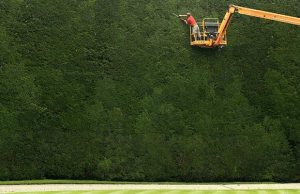I have a hedge. It has a monstrous life of its own filled with birds and cats and caterpillars and cobwebs, and stands fat and strong between my jungle-garden and the race-course road where people travel at top speed towards town in the mornings. The trajet home is even faster as who wants to miss their apero? They are going so fast that it seems they have never noticed the speed limit which is a clearly-posted, sedate 30 kph through the village.
And now it seems that one of these drivers has complained about my hedge impeding their vitesse while sailing over the speed bumps around the corner. There is also a neighbour who is also a possible suspect. Anyway. I’ve been busted, yet again, by the hedge police.
This time they’ve even sent coloured photos: a set of four. In them the hedge looks quite perky and healthy. In the background, over the road is the ugly house that was built in the nature reserve. Needless to say, they do not have a hedge, so are possibly jealous of mine.
 Anyway, we are routinely busted by the hedge police as both height and width of roadside verdure are strictly regulated and seriously enforced. A young city-slicker usually arrives with a clipboard and an attitude. Long conversations with cantonal officials have resulted in civil engineers surveying our property, the hedge, and the road. We keep winning (Geneva has stolen a bit of our land to widen their road) and the hedge keeps growing. Nothing else happens.
Anyway, we are routinely busted by the hedge police as both height and width of roadside verdure are strictly regulated and seriously enforced. A young city-slicker usually arrives with a clipboard and an attitude. Long conversations with cantonal officials have resulted in civil engineers surveying our property, the hedge, and the road. We keep winning (Geneva has stolen a bit of our land to widen their road) and the hedge keeps growing. Nothing else happens.
One of my summertime jobs in Canada was pruning baby Christmas trees, so I consider myself something of a pro when it comes to pruning. Needless to say, I never get to stand on the ladder or use the electric trimmers except as a special treat. I’m the orange leaf-rake and green compost-bag girl. I push the communal garden refuse container into place. I snip the odd branch with the old-fashioned, dull, wooden-handled shears.
So, I will pay my annual respects to my hedge. I will clip the fragrant wet cedar, spruce, laurel and other hedge-bushes that I don’t know the names of. I will work diligently for an hour or two and fill the compost bin and revel in a feeling of deep satisfaction. I will have a bath in water that will become like the insides of a China tea pot – flecked with green leaves and mysterious brown bits.
I will obey the Geneva Ordinance of the Roads dated April 28, 1967, L1 10, article 70 et al. and will (temporarily) be back in from my walk on the wild side of the law.